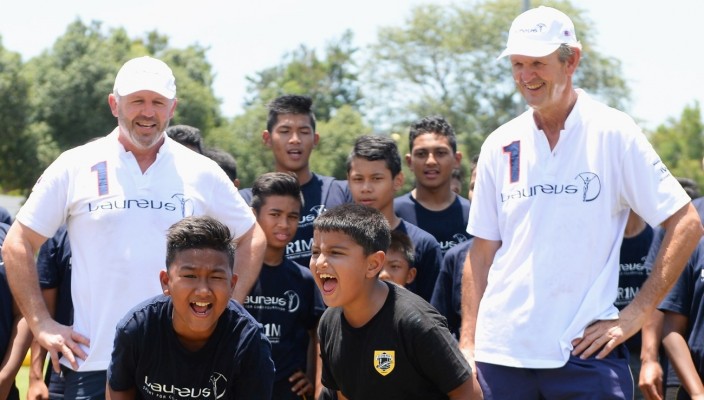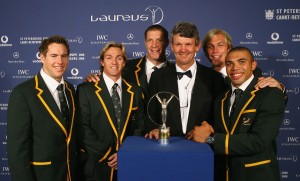LAUREUS LEGEND MORNÉ DU PLESSIS LEADS CELEBRATIONS FOR THE RUGBY MATCH THAT CHANGED THE WORLD
- South Africa enjoys 20th anniversary of 1995 Rugby World Cup victory
- ‘The match had a lasting effect on how people could use sport to value each other and understand each other a little better’ – says former Springboks manager Morné du Plessis
- ‘1995 inspired a lot of the work that Laureus does’ adds du Plessis
CAPE TOWN, June 25, 2015 – South African rugby yesterday celebrated the 20th anniversary of the historic 1995 Rugby World Cup win which played such a part in uniting the country and making people aware of the power of sport.
Laureus World Sports Academy Member and rugby legend Morné du Plessis, manager of the winning Springbok side, recalls: “This was the classic example of how sport can change the world. It certainly changed our country and had a lasting effect on how people could use sport to value each other and come to understand each other a little better.
“It’s a story that millions of people around the world have shared; this miracle of sport and the miracle of a great leader, Nelson Mandela, who of course became the Patron of Laureus.”
South Africa won the Rugby World Cup Final 15-12 against the All Blacks, whose captain was another Laureus Academy Member, Sean Fitzpatrick. It was the first major sporting event to take place in South Africa following the end of apartheid and it proved to be a catalyst in bringing the rainbow nation together.
Nelson Mandela, the President of South Africa, wearing a Springboks rugby shirt and cap, famously presented the Webb Ellis Cup to the South African captain François Pienaar, after the match in Ellis Park, Johannesburg.
Du Plessis adds: “It really was a marvellous time in the country. It’s spoken of, around the world, as one of the true miracle stories in sport. It largely inspired a lot of the work that Laureus does, certainly in South Africa; the fact that sport can be such a powerful initiator of social change.”
At what point did du Plessis and his Springbok team-mates think they could win? “It came slowly. When we actually arrived for the first match at Newlands [Cape Town] it was just the most incredible sense of anticipation. People were happy and were proud of their country and the players could actually feel that.
“The players walked around and got that atmosphere and that really was just something unbelievably special and I think that started the realisation for the team that this was a special event. This was a special moment. This was this was more than just rugby and so it grew through the tournament
“We’d get to hotels and the staff of the hotel would be outside the hotel. The whole staff singing welcome songs and then of course President Mandela got involved and came to a practice and that grew into a relationship in itself. So a really memorable time in our country.”
Five years later, President Mandela came to the inaugural Laureus World Sports Awards in Monaco. He said: “Sport has the power to change the world. It has the power to inspire. It has the power to unite people in a way that little else does. Sport can create hope where once there was only despair.”
This became the philosophy of Laureus; the driving force behind its work and behind the creation of the Laureus Sport for Good Foundation.
Now the Laureus Sport for Good Foundation uses the inspirational power of sport to improve the lives of young people, not just in South Africa but around the world. Since its inception in 2000 Laureus has raised €60 million and helped millions of young people.
The Laureus World Sports Academy is a unique association of 52 of the greatest living sporting legends, including Morné du Plessis, who volunteer their time to support the work of the Foundation. Laureus currently supports more than 150 community projects in 35 countries, promoting the positive effect that sport has in tackling some of the world’s most challenging social issues from mental health, HIV/Aids, substance abuse, juvenile crime, discrimination and gender equality.
Related Posts
« EP GRAND CHALLENGE PREVIEW FOR JUNE 27 HIGLANDERS NAME TEAM TO TAKE ON THE ‘TAHS »


















